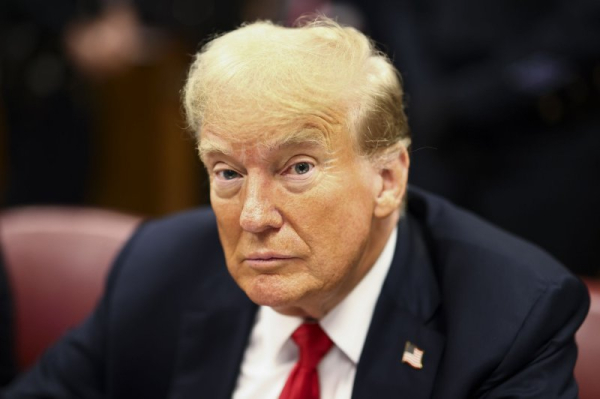New bottles, old wine: Trump’s ‘America First’ agenda should spark debate

Former President Donald Trump sits in the courtroom at Manhattan Criminal Court in New York on Tuesday, May 28, 2024. Pool Photo by Andrew Kelly/UPI | License Photo
As Nov. 5 and the general elections grow closer in the U.S., regarding foreign policy, Donald Trump’s embrace of “America First” should engage and enrage public debate. But that will not be the case. One major reason is that foreign policy rarely makes much of a difference in presidential elections unless, as with Vietnam, the nation is torn over how to proceed. A second is that because of Trump’s preference for hyperbole and prevarication, that is outright lying, the actual meaning of America First is both hidden and distorted.
If a third reason were necessary to relegate foreign policy to secondary status, it is historical amnesia. America First has been part of the nation’s DNA centuries before it seemingly came of age in the 1930s. George Washington’s famous farewell address in 1796 eschewed “permanent alliances.” Washington was indeed pragmatic, placing national interests as the measure of national priorities. Advertisement Advertisement
It would take another 12 decades for the other side of Washington’s coin to become fully formed. In this case, it was President Woodrow Wilson’s vision of the need for “internationalism” and “idealism” as global goods as an alternative to Washington’s pragmatism. Hence, World War I was the means to end all wars to make the world safe for democracy. And in the aftermath, a League of Nations could be created to ensure that peace among states would eliminate war after 1918.
Wilsonian foreign policy therefore was expansive and international in reach in which the common collective of the many would transcend Hobbesian views of a dystopian world. After the humanitarian catastrophe of the so-called Great War, common sense and rationality could dictate international relations and relegate war to Lenin’s dustbin of history.
Unfortunately, Wilson could not persuade his own country and Senate to follow his lead. The League of Nations and the armistice that ended World War I merely were the predicates for an even greater conflict that would explode two decades later in 1939 with Nazi Germany’s unprovoked invasion of Poland and Japan’s aggression in China, Manchuria and the attack on Pearl Harbor on Dec. 7, 1941.
Wilson’s idealism became confused with isolationism of the 1930s and indeed the start of the first America’s First movement to stand clear of foreign entanglements and the conflicts in Asia and Europe. Isolationism grew to dominate the pragmatic Washingtonian view. And many in the United States believed that a metaphorical draw bridge could be raised and two vast oceans used as buffers to isolate and protect America from the vagaries and perils of overseas engagements. Advertisement
This extended to economics, trade and finance and was manifest in the infamous Smoot-Hawley tariffs that stressed protectionism. Given Trump’s threats to leave or reduce U.S. commitment to NATO or allies that do not pay their fair share for defense and his promise to impose tariffs on European and Chinese imports in his first term, it is not difficult to imagine how Trump might double down on those policies in a second term. This divergence between Washington’s pragmatism and the siren-like call of protectionism and isolationism of the 1930s America Firsters raise legitimate fears over a Trump presidency.
In reality, this is a case of old wine — Wilson versus Washington — in new bottles, meaning Trump’s use of America First. The question is the lengths to which Trump would indeed consider protectionism and isolationism as valid national interests overriding U.S. responsibilities as a global superpower to maintain peace, prosperity and stability. In this case, Trump provides no clear cut evidence of his leanings.
One could argue that defending Taiwan in a war with China is not in American interests. Taiwan is a specific and hence unique Chinese interest. Having obtained control over the island, the major point of friction with the U.S. would no longer exist. Hence, relations could improve even at Taiwan’s expense. Whether this logic would extend to Ukraine is surely debatable. Advertisement
If Trump were consistent and predictable, then a case could be made that America First would be expressed in Washingtonian terms. But Trump is neither of those things. Nor does Trump have an obvious strategic framework for making decisions, relying instead on instinct and feelings as he readily admits.
Should Trump win, he would indeed be using new bottles for holding old wine. The degree to which the past is prologue and the record of his first term matters, the likely outcome is not good. The reality may be that Trump’s old wine has turned to vinegar. And that will be undrinkable.
Harlan Ullman is UPI’s Arnaud de Borchgrave Distinguished Columnist, a senior adviser at Washington’s Atlantic Council, the prime author of “shock and awe” and author of “The Fifth Horseman and the New MAD: How Massive Attacks of Disruption Became the Looming Existential Danger to a Divided Nation and the World at Large.” Follow him @harlankullman. The views and opinions expressed in this commentary are solely those of the author.